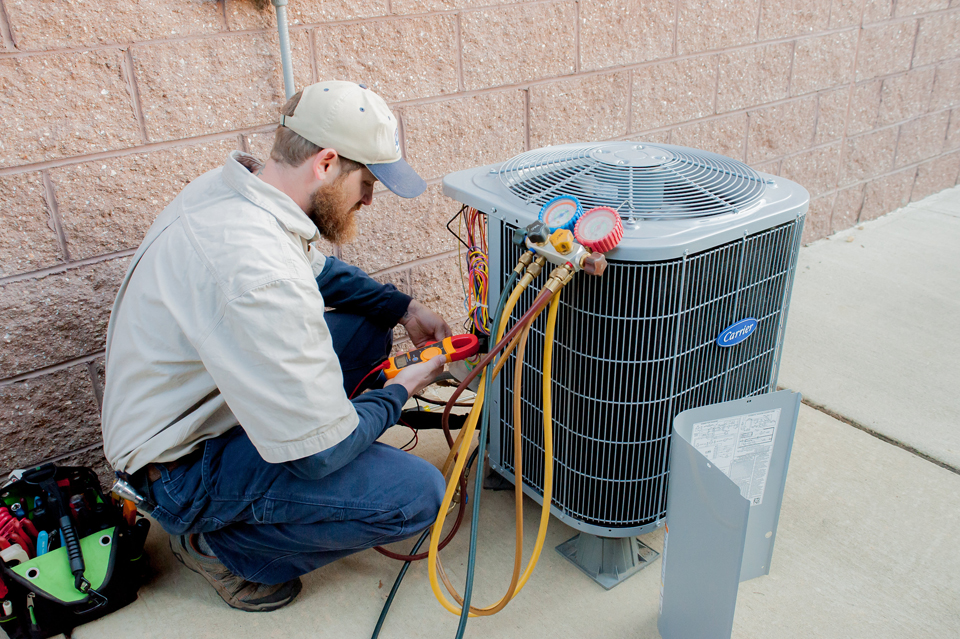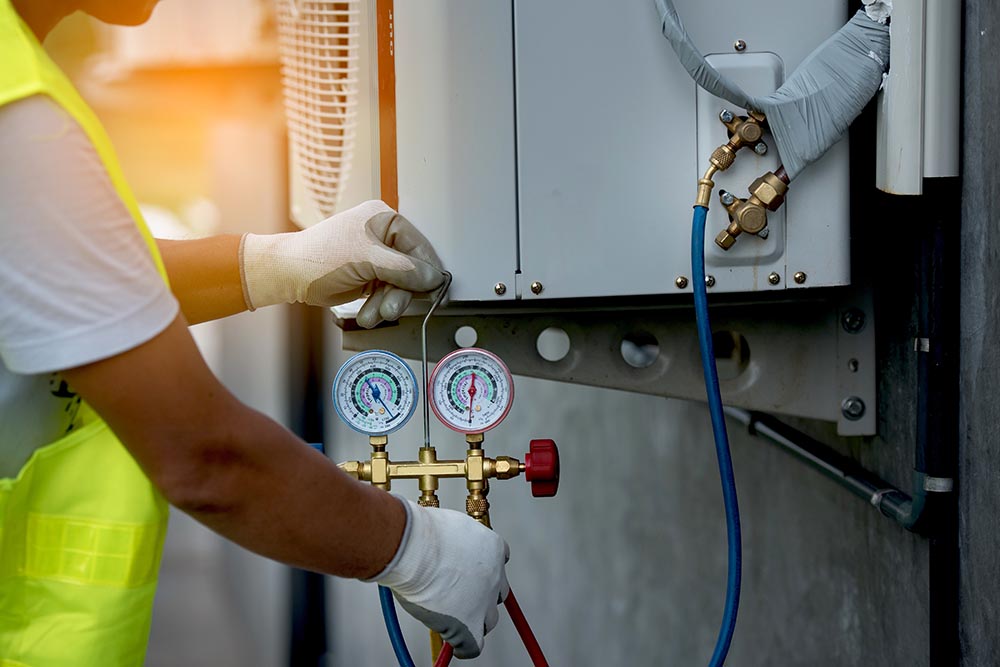Picking In Between a Warmth Pump and Heating System: Key Factors To Consider for Your HVAC Demands
When reviewing home heating options for HVAC requires, the decision between a warmth pump and a heating system can be complex. Each system supplies distinctive benefits tailored to details climates and power effectiveness goals. Understanding these distinctions is crucial for making an educated choice. Key factors such as setup prices and ecological impact further make complex the choice procedure. Which choice really straightens with one's comfort and sustainability choices? The complying with areas will discover these considerations thoroughly.
Understanding Warmth Pumps: Exactly How They Work and Their Advantages
While numerous home owners take into consideration different home heating options, recognizing how heatpump feature and their advantages can substantially influence their choice. Heatpump operate by moving warmth rather than producing it. In the winter months, they draw out warmth from the outdoors air or ground and transfer it inside your home, while in the summer season, they reverse this procedure, cooling the home by getting rid of warmth outside. This dual performance makes them functional for year-round environment control.One of the main advantages of heat pumps is their power efficiency. They utilize substantially less electrical energy contrasted to traditional furnace, potentially causing reduced energy bills (furnace replacement). In addition, heatpump have a smaller sized carbon footprint, making them an environmentally friendly option. They likewise need much less upkeep than conventional systems, contributing to long-term cost savings. In general, comprehending the auto mechanics and advantages of warm pumps can help property owners make notified choices regarding their heating and cooling needs
Exploring Furnaces: Types, Procedure, and Benefits
Heaters can be found in different types, including gas, electric, and oil models, each with distinctive operational mechanisms. Understanding these distinctions is vital, as they impact efficiency and home heating efficiency. Furthermore, furnaces offer numerous advantages, such as constant heat output and integrity in colder environments.
Kinds of Heating systems
Furnace can differ substantially in style and procedure, with heaters being a prominent choice amongst house owners. There are several sorts of heating systems, each utilizing various gas sources and modern technologies. Gas heating systems prevail, leveraging gas to create warmth effectively. Electric furnaces, on the various other hand, utilize electrical resistance to produce heat, commonly favored for their uncomplicated installation. Oil heaters, while less typical, work in areas with limited gas gain access to (heat pump service). In addition, condensing heating systems take full advantage of energy efficiency by reusing and recording exhaust gases. Each type runs via a system of heat exchangers and ductwork to disperse cozy air throughout a home. Understanding the differences in between these furnace kinds is important for notified cooling and heating choices
Benefits of Heating systems
For home owners seeking reputable heat throughout cold months, the advantages of heaters are significant. Heating systems supply regular home heating, ensuring even temperature levels throughout the home. They are specifically effective in extreme cold, typically outperforming heat pumps in freezing conditions. Different kinds, consisting of gas, electrical, and oil heaters, use flexibility to fulfill diverse requirements and preferences.Furnaces likewise have a tendency to have lower initial setup expenses contrasted to warm pumps, making them a much more obtainable alternative for many. Their robust style adds to a longer lifespan, with numerous units lasting over 15 years with proper maintenance. Furthermore, modern heaters are frequently geared up with advanced technology for boosted performance, which can bring about minimized power expenses. In general, furnaces continue to be a reputable selection for efficient home heating.

Power Performance: Comparing Warmth Pumps and Furnaces
When comparing energy performance in between heatpump and furnaces, the Seasonal Energy Performance Proportion (SEER) plays a crucial duty in identifying performance. Furthermore, an operational cost analysis reveals the long-lasting economic effects of each system. Understanding these aspects can guide property owners in making notified choices concerning their heating solutions.
Seasonal Energy Effectiveness Proportion
Power performance plays a necessary function in the decision-making procedure in between heatpump and furnaces, particularly when considering the Seasonal Energy Efficiency Ratio (SEER) This metric steps the cooling effectiveness of heatpump over a whole air conditioning period, supplying a standard method to examine performance. Higher SEER ratings indicate greater power performance, converting to reduced power usage and reduced utility bills. On the other hand, heaters are generally analyzed making use of the Yearly Fuel Usage Performance (AFUE) ranking, which mirrors heating efficiency. When comparing these 2 systems, home owners need to focus on SEER scores for heatpump, as they straight influence general energy financial savings and ecological sustainability. A detailed understanding of SEER can notably affect the long-lasting complete satisfaction and cost-effectiveness of the chosen cooling and heating option.
Operational Price Analysis
Recognizing the functional costs connected with warm pumps and furnaces is essential for house owners assessing their alternatives. Warm pumps generally supply higher energy performance, converting electrical energy right into heat with marginal waste. This results in reduced month-to-month utility bills, particularly in moderate environments. Conversely, conventional furnaces, specifically gas models, might have lower in advance expenses however can sustain greater operational expenses over time as a result of fuel rates and efficiency ratings.Moreover, heatpump can work as both heating and cooling down systems, possibly decreasing the requirement for different a/c devices. While initial investments for heatpump might be higher, their long-lasting financial savings in power efficiency can make them a much more cost-efficient choice for numerous families. Cautious evaluation of neighborhood power prices is necessary to establish the best option.
Installation Costs: What to Anticipate for each and every Heating System
Installation expenses for furnace can vary substantially in between heatpump and heaters, affecting homeowners' decisions. Heat pumps typically have higher upfront installation expenses, usually ranging from $3,500 to $8,000, relying on the unit dimension and complexity of setup. This includes the outside unit, indoor handling system, and necessary ductwork modifications. Alternatively, heaters have a tendency to have lower initial prices, balancing in between $2,500 and $6,000, which can be appealing for budget-conscious home owners. Installation costs can enhance if substantial ductwork is required.Moreover, the option of fuel kind for heating systems-- natural gas, gas, or electric-- can additionally influence installation costs. While heat pumps use energy efficiency, their first investment might discourage some purchasers. Inevitably, reviewing installment costs alongside long-term savings and effectiveness will aid home owners in making educated choices regarding their furnace.
Environment Factors To Consider: Which System Carries Out Much Better in Your Location
Just how do environment conditions affect the effectiveness of heater? The performance of heatpump and furnaces can differ considerably relying on the regional climate. In moderate climates, warmth pumps excel by efficiently moving heat from the outdoors air, making them an energy-saving alternative. Their efficiency lessens in incredibly cold temperature levels, where they may struggle click for more info to extract enough warmth. On the other hand, furnaces, particularly gas models, give dependable and consistent warmth despite outside problems, making them more effective in colder regions.In areas that experience milder winters, heatpump can run successfully year-round, offering both heating & cooling. In contrast, regions with rough winters months often profit from the robustness of heating systems. Ultimately, understanding the neighborhood environment is crucial when choosing between a warm pump and a furnace, as it directly impacts their operational effectiveness and general efficiency.
Upkeep Demands: Long-Term Take Care Of Heat Pumps vs. Furnaces
While both heatpump and heaters require routine upkeep to assure peak performance, their certain requirements and treatment routines differ considerably. Heaters normally require less constant attention, with annual examinations sufficing to look for gas leaks, clean filters, and analyze total capability. Their simpler layout usually permits straightforward repairs.In contrast, warm pumps require semiannual maintenance due to their double function in heating & cooling. This consists of cleaning coils, examining cooling agent degrees, and making certain that both the indoor and exterior systems function at their finest. Additionally, heatpump maintenance typically includes even more complex elements, making professional maintenance essential.Neglecting maintenance can bring about decreased effectiveness and raised energy see expenses for both systems. Inevitably, house owners should take into consideration these long-lasting treatment needs when selecting between a warm pump and a heater, as proactive upkeep can prolong the life expectancy and efficiency of either system substantially.
Environmental Effect: Picking a Sustainable Home Heating Alternative
The ecological effect of heater is an essential analysis for house owners seeking lasting alternatives. Heatpump are normally a lot more energy-efficient than traditional furnaces, as they move warmth instead of create it, substantially lowering carbon emissions. By using renewable resource resources, such as geothermal or air-source heat pumps, home owners can additionally decrease their eco-friendly footprint.On the other hand, all-natural gas heaters discharge greenhouse gases and add to air pollution, though they frequently provide greater warmth output. Improvements in modern technology have actually led to the development of high-efficiency heaters that lessen emissions.Ultimately, picking a heating system check out this site entails considering effectiveness against ecological influence. House owners are motivated to mirror on regional power sources and motivations for renewable systems, guaranteeing a selection that aligns with both personal comfort and ecological obligation. The choice affects not just immediate convenience but also lasting sustainability and ecological health and wellness.
Frequently Asked Inquiries
How Lengthy Do Warmth Pumps and Furnaces Normally Last?
The life expectancy of heatpump normally ranges from 15 to 20 years, while heating systems can last in between 15 to 30 years. Routine maintenance considerably affects their long life and effectiveness in supplying home heating remedies.
Can I Use a Heatpump in Very Cold Climates?
Heatpump can operate in incredibly cool environments, however their efficiency reduces as temperatures decrease. In such conditions, supplemental home heating resources may be necessary to maintain comfy indoor temperature levels and ensure peak efficiency.

What Is the Sound Level of Heat Pumps Versus Furnaces?
The noise degrees of heatpump and heaters differ considerably. Usually, heat pumps operate even more silently than conventional heating systems, making them more effective for those conscious sound, while heaters may produce louder functional noises during heating cycles.
Are Warmth Pumps Suitable for Both Home Heating and Cooling?
Warm pumps are undoubtedly ideal for both cooling and heating (heat pump service). They work by moving warm, giving reliable temperature level control year-round, making them a versatile selection for homeowners seeking an all-in-one heating and cooling solution
What Size Heater Do I Required for My Home?
Figuring out the proper dimension heater for a home needs assessing variables such as square footage, insulation high quality, local climate, and the home's format. Consulting a specialist can assure an accurate evaluation and perfect convenience. Warm pumps normally provide higher power efficiency, transforming electrical power right into warm with minimal waste. In moderate climates, warm pumps excel by efficiently transferring warmth from the outdoors air, making them an energy-saving option. Alternatively, furnaces, particularly gas versions, give consistent and trustworthy warmth regardless of exterior conditions, making them better in cooler regions.In locations that experience milder winters months, heat pumps can run efficiently year-round, supplying both home heating and cooling. Warmth pumps are normally extra energy-efficient than standard heaters, as they move warmth instead than create it, substantially decreasing carbon discharges. By utilizing sustainable power resources, such as air-source or geothermal warm pumps, homeowners can even more minimize their environmental footprint.On the other hand, all-natural gas furnaces give off greenhouse gases and add to air pollution, though they frequently give greater warm result.
Comments on “Prevent Costly Repairs with Scheduled heat pump service”